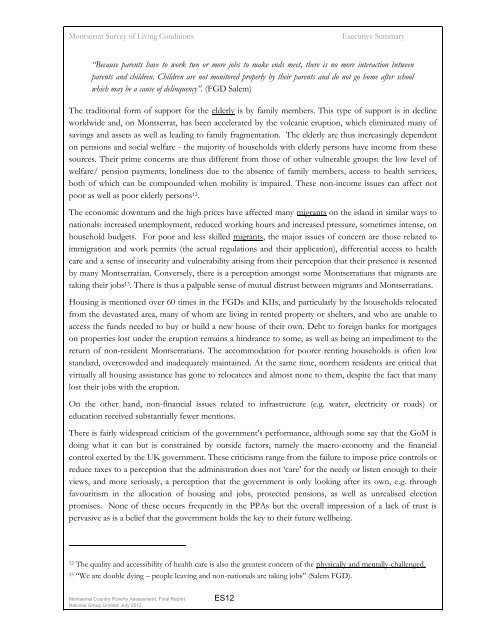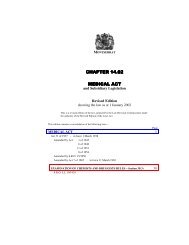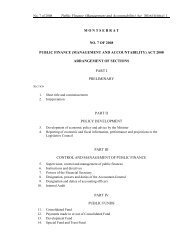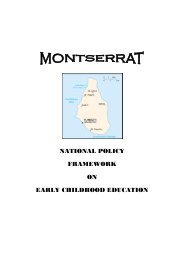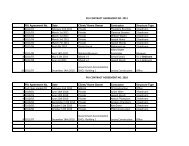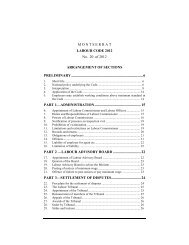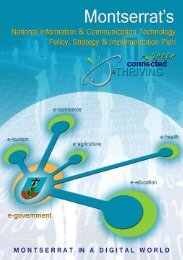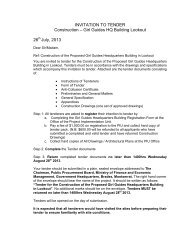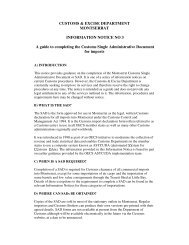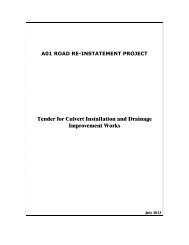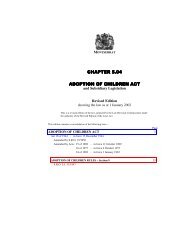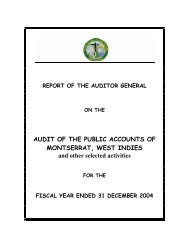Montserrat Survey of Living Conditions (MSLC) Executive Summary
Montserrat Survey of Living Conditions (MSLC) Executive Summary
Montserrat Survey of Living Conditions (MSLC) Executive Summary
Create successful ePaper yourself
Turn your PDF publications into a flip-book with our unique Google optimized e-Paper software.
<strong>Montserrat</strong> <strong>Survey</strong> <strong>of</strong> <strong>Living</strong> <strong>Conditions</strong><strong>Executive</strong> <strong>Summary</strong>“Because parents have to work two or more jobs to make ends meet, there is no more interaction betweenparents and children. Children are not monitored properly by their parents and do not go home after schoolwhich may be a cause <strong>of</strong> delinquency”. (FGD Salem)The traditional form <strong>of</strong> support for the elderly is by family members. This type <strong>of</strong> support is in declineworldwide and, on <strong>Montserrat</strong>, has been accelerated by the volcanic eruption, which eliminated many <strong>of</strong>savings and assets as well as leading to family fragmentation. The elderly are thus increasingly dependenton pensions and social welfare - the majority <strong>of</strong> households with elderly persons have income from thesesources. Their prime concerns are thus different from those <strong>of</strong> other vulnerable groups: the low level <strong>of</strong>welfare/ pension payments, loneliness due to the absence <strong>of</strong> family members, access to health services,both <strong>of</strong> which can be compounded when mobility is impaired. These non-income issues can affect notpoor as well as poor elderly persons 12 .The economic downturn and the high prices have affected many migrants on the island in similar ways tonationals: increased unemployment, reduced working hours and increased pressure, sometimes intense, onhousehold budgets. For poor and less skilled migrants, the major issues <strong>of</strong> concern are those related toimmigration and work permits (the actual regulations and their application), differential access to healthcare and a sense <strong>of</strong> insecurity and vulnerability arising from their perception that their presence is resentedby many <strong>Montserrat</strong>ian. Conversely, there is a perception amongst some <strong>Montserrat</strong>ians that migrants aretaking their jobs 13 . There is thus a palpable sense <strong>of</strong> mutual distrust between migrants and <strong>Montserrat</strong>ians.Housing is mentioned over 60 times in the FGDs and KIIs, and particularly by the households relocatedfrom the devastated area, many <strong>of</strong> whom are living in rented property or shelters, and who are unable toaccess the funds needed to buy or build a new house <strong>of</strong> their own. Debt to foreign banks for mortgageson properties lost under the eruption remains a hindrance to some, as well as being an impediment to thereturn <strong>of</strong> non-resident <strong>Montserrat</strong>ians. The accommodation for poorer renting households is <strong>of</strong>ten lowstandard, overcrowded and inadequately maintained. At the same time, northern residents are critical thatvirtually all housing assistance has gone to relocatees and almost none to them, despite the fact that manylost their jobs with the eruption.On the other hand, non-financial issues related to infrastructure (e.g. water, electricity or roads) oreducation received substantially fewer mentions.There is fairly widespread criticism <strong>of</strong> the government’s performance, although some say that the GoM isdoing what it can but is constrained by outside factors, namely the macro-economy and the financialcontrol exerted by the UK government. These criticisms range from the failure to impose price controls orreduce taxes to a perception that the administration does not ‘care’ for the needy or listen enough to theirviews, and more seriously, a perception that the government is only looking after its own, e.g. throughfavouritism in the allocation <strong>of</strong> housing and jobs, protected pensions, as well as unrealised electionpromises. None <strong>of</strong> these occurs frequently in the PPAs but the overall impression <strong>of</strong> a lack <strong>of</strong> trust ispervasive as is a belief that the government holds the key to their future wellbeing.12 The quality and accessibility <strong>of</strong> health care is also the greatest concern <strong>of</strong> the physically and mentally-challenged.13 “We are double dying – people leaving and non-nationals are taking jobs” (Salem FGD).<strong>Montserrat</strong> Country Poverty Assessment, Final ReportHalcrow Group Limited, July 2012.ES12


